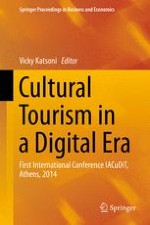2015 | OriginalPaper | Chapter
Wandering as the Determinant of Identity and Difference in Ancient Greek Literature: The Paradigm of Herodotus and Pausanias
Author : Pitropou Ekaterini
Published in: Cultural Tourism in a Digital Era
Publisher: Springer International Publishing
Activate our intelligent search to find suitable subject content or patents.
Select sections of text to find matching patents with Artificial Intelligence. powered by
Select sections of text to find additional relevant content using AI-assisted search. powered by
